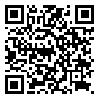BibTeX | RIS | EndNote | Medlars | ProCite | Reference Manager | RefWorks
Send citation to:
URL: http://jdisabilstud.org/article-1-2749-en.html
2- Professor in the Faculty of Clinical Psychology, Shahed University, Tehran, Iran
3- Associate Professor, Faculty of Clinical Psychology, Kharazmi University, Tehran, Iran
4- Assistant Professor, Faculty of Biostatistics, Tarbiat Modares University, Tehran, Iran
Abstract
Background & Objectives: One of the essential factors that affect the quality of sleep and can be a sleep–inducing factor is excessive Internet use or Internet addiction. Research suggests that cognitive emotion regulation, metacognitive beliefs, anxiety sensitivity, loneliness, and sleep duration contribute to sleep quality. Therefore, it is crucial to develop and study models that can help understand fully the relationship between sleep quality and Internet addiction and other influential factors in this field. On the other hand, students are at high risk due to their special needs in this field. Therefore, there is considerable health significance in identifying factors that increase their sleep quality and mental health. Thus, this study aimed to investigate the fitness of the structural model of the relationship between Internet addiction and sleep quality through mediating cognitive emotion regulation, metacognitive beliefs, and anxiety sensitivity and modulating loneliness and sleep time in students.
Methods: The research method was the modeling of structural equations. In this structural model, sleep quality is a criterion variable, cognitive emotion regulation, metacognitive beliefs, and anxiety sensitivity are mediating variables, loneliness and sleep time are moderating variables, and Internet addiction is a predictor variable. The statistical population comprised students of all educational levels of public and private universities in Tehran City, Iran, in the academic year 2020–2021. Of them, 403 students were selected by the available sampling method and were requested to answer the study questionnaires through cyberspace. The inclusion criteria included being a student, consenting to participate in the study, not suffering from certain physical and mental illnesses, and not attending psychotherapy sessions during the last 6 months. The study tools used in cyberspace included the Internet Addiction Questionnaire (Young, 1998), Metacognition Questionnaire (Wells & Cartwright–Hatton, 2004), Cognitive Emotion Regulation Questionnaire (Garnefski et al., 2001), Anxiety Sensitivity Inventory (Reiss & McNally, 1985), Pittsburgh Sleep Quality Index (Buysse et al., 1989), and Revised UCLA Loneliness Scale (Russell et al., 1980). The obtained data were analyzed using SPSS version 23 software, and the structural equation analysis method was done in PLS software version 2.0. all analyses were performed at a significance level of 0.05.
Results: The results indicated that Internet addiction affected students' sleep quality both directly (β=0.08, p=0.016) and through the mediation of cognitive emotion regulation and metacognitive beliefs (p<0.05). There was also a relationship between Internet addiction and sleep quality with a moderating effect on sleep duration (β=0.40, p<0.001). The conceptual model had a good fit index despite the two mediating variables of cognitive emotion regulation and cognitive beliefs and the sleep duration modifier variable (GOF=0.57).
Conclusion: The findings of this study showed the mediating relationship between cognitive emotion regulation and cognitive beliefs, as well as the moderating effect of sleep time on the relationship between Internet addiction and sleep quality in students.
| Rights and permissions | |
 |
This work is licensed under a Creative Commons Attribution-NonCommercial 4.0 International License. |



